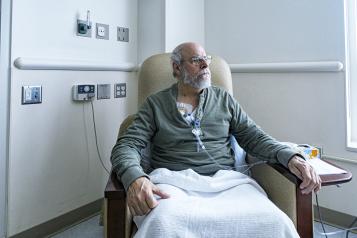The hidden wait for cancer care

One in two people will develop cancer during their lifetime in the UK. And for most cancers care can only begin with a referral from GP to hospital teams for tests and treatment.
The NHS Long Term Plan aims to improve cancer diagnosis and treatment, and more recently NHS England identified that short waiting times not only lead to better outcomes and fewer complications but are important in terms of easing patient anxiety and improving experience too.
However, our research paints a worrying picture that suggests there is still much to do to ensure cancer is flagged at the earliest opportunity and that pathways to diagnosis and treatment are as smooth as possible.
Our research also aims to help the government and NHS leaders understand the importance of seeing the person behind the cancer, and that small changes can make a big difference to people at an incredible difficult time in their lives.
Key Findings
-
Almost half, 45%, of respondents are not referred for suspected cancer at their first appointment.
-
Over one in four, 28%, wait up to a month after their first appointment to be told they are being referred.
-
And almost one in six, 16%, wait over a month after their first appointment.
-
Around one in seven, 14%, are still waiting for referrals to be confirmed over a month after the decision to refer.
-
And one in 10 cancer referrals don’t directly progress to a hospital appointment, with some referrals either rejected, lost, or otherwise not booked.
Who did we interview?
We conducted a poll with over 2,000 adults in England between September and October last year to understand people’s experiences of getting a GP practice referral.
We received a further 1,825 responses to the survey via our local Healthwatch network. This analysis focuses on 385 adults who were referred or expected to be referred for suspected cancer.
Official NHS data shows that targets for patients to attend their first hospital appointment within two weeks have not been hit since May 2021. And targets for first treatment within two months have been missed since December 2015.
So, we know that people referred to hospitals with suspected cancer are not being diagnosed or treated quickly enough.
People’s experiences before referrals are made
There is a blind spot in national data around people’s experience of getting a referral to hospital. And while some waiting time is to be expected, there must be a greater focus on understanding people’s full journey, from the first time they notice symptoms to getting treatment.
Our findings cover the stages of the referral blind spot, including how long it can take to get a GP appointment and how long it can take people to get a referral before they even join long wait lists.
Hidden waiting list
Of the 334 respondents who got a cancer referral, just over one in two were referred at their first appointment. For almost one in six, it took a month or longer between their first GP practice appointment about their symptoms and being told they were going to be referred.
In some cases, the GP team wanted to try other treatment or medication first. But in other cases, the reasons for referral delays are more concerning, such as people not feeling their condition was taken seriously, stating the appointment was too rushed, or flagging that they struggled to make themselves heard or understood.
Some participants even suggested that referral delays were down to a lack of specialist knowledge in primary care. This point echoes feedback to the call for evidence for the government’s 10-year cancer plan, where respondents felt teams could benefit from more training on the signs and symptoms of cancer.
Other respondents to our survey mentioned their lack of personalised access choices as the reason for long waits for a referral. For example, in cases that required inspection of skin lesions, appointments over the phone were highlighted as being unacceptable.
The impact of long waits
The relief of finally getting a referral can turn to frustration and worry when after the two-week wait, patients told us they hadn’t heard anything back.
One in seven waited a month or more before getting confirmation from the hospital or community clinic that the referral was accepted.
People have to ‘chase’ referrals
We heard from people who had to “chase” the GP or hospital teams themselves. Some found promised referrals had never happened at all, or referrals had stalled, been refused, or been cancelled altogether. This causes additional stress for the patient, but it’s also likely to put unnecessary pressure on other areas of the NHS when patients look for alternative routes to care, such as, from a different GP, NHS111, out of hours GP, A&E, or pharmacy.
“I approached my GP 5 months ago with abdominal pain. He said he thought I might have cancer. I had a scan in April which showed a tumour on my pancreas and a mass in my ovary. I am still waiting for a diagnosis. Nearly 6 months.”
Risk to people’s lives
For all conditions, this can cause frustration and confusion. But for cancer, poor administrative processes or communication between NHS teams can have dire consequences if it means a delay in a cancer diagnosis.
For around one in four, their mental health, ongoing pain and overall condition worsened due to delays and failed referrals.
Seeking an alternative
Three in four of the respondents in our survey subsequently took some kind of alternative action while trying to get a referral from their GP practice, such as making additional appointments or even going to A&E.
And three per cent of the respondents felt they had no choice but to go private, including some patients who reported GP teams as actively encouraging them to go private due to long NHS waits.
Our view
Louise Ansari, our Chief Executive, said:
“For all conditions, long waits for referrals to hospital can cause frustration and confusion. But for cancer patients, any delay in referrals and diagnosis can put people's lives at risk.
"We know that early identification of cancer can save lives, but our research shows that too often poor processes and disjointed communication between NHS teams in general practice and hospitals can lead to referrals getting lost, causing serious delays.
"Healthcare leaders need to address delays in progressing referrals, particularly for cancer.
"This should include acting on plans to improve GP access so that people can get timely diagnosis and recruiting more care navigators who can ensure life-saving cancer referrals are not lost and people know where they are in their wait for appointments. People need to be given clear information about their referral process and a point of contact they can approach while they wait.”
Healthcare leaders need to address delays in progressing referrals, particularly for cancer.
Our recommendations
We have set out actions for the government, NHS England and Integrated Care Systems (ICS) to support GP practices and hospitals with referral processes.
-
NHS England must support GP teams to implement plans to improve GP access so people can get timely referrals. This should include vital plans to recruit and train more care navigators who can ensure life-saving cancer referrals don't go missing and help patients know where they are waiting for appointments.
-
First appointments in general practice must also work for patients so that they can communicate their conditions as effectively as possible. This requires patients to choose the appointment type, time, place, and healthcare professional. It also includes offering longer appointment slots to those who need them.
-
People's communications must be accessible so they don't miss appointments due to receiving information in a format they can't understand. This requires practices to record people's communication needs and for these to also be available to hospital teams.
-
NHS England must improve online referral trackers and give patients access to these trackers. Patients, GP teams and hospital teams should all have access to the same basic information about which stage of the referral process the people have progressed to. This would help people who told us they received no communication with their referral and had to chase teams themselves.

Get the latest insight
Stay up to date with what people are telling us about health and social care.
Data comes from an online survey about GP referrals in England which was distributed via two methods. Firstly, Panelbase was commissioned by Healthwatch England to host the survey (Data collected between 29 September to 20 October 2022). Secondly, the survey was distributed by the Healthwatch local network. (Data collected between 22 August to 11 October 2022). This analysis is based on a subset of the referrals data related to cancer from both data sources.


